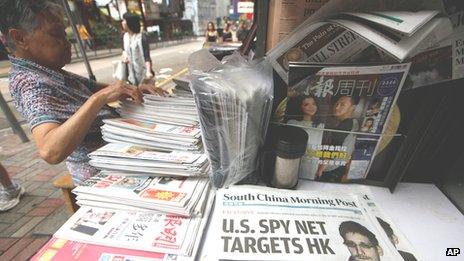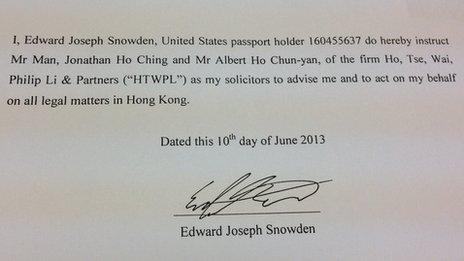Why did US fugitive Edward Snowden leave Hong Kong?
- Published

Edward Snowden had fled to Hong Kong when he revealed himself to be behind the leak of classified US intelligence documents
Hong Kong Chief Executive CY Leung has publicly defended the city's decision not to rubber stamp a request from the US to detain fugitive former US intelligence contractor Edward Snowden.
Speaking to reporters, he said the move demonstrated a commitment to justice and procedural fairness.
But Albert Ho, Mr Snowden's solicitor, has told me that the back story is tinged with political intrigue.
The ex-CIA analyst hired Mr Ho, one of Hong Kong's best-known human rights lawyers, and his junior associate Jonathan Man two weeks ago, shortly after arriving in the city.
It was Mr Man who accompanied Mr Snowden when he checked out of the Mira hotel and into a safe house when his identity was unmasked to the world.
Mr Ho described the IT specialist as bright, sharp and extremely technology savvy, with a keen appetite for US politics. At first, Mr Snowden seemed committed to staying in Hong Kong and fighting against extradition through local courts.
But soon, reality sank in.
Mr Snowden's lawyers told him it was very possible that he might be in jail throughout the lengthy legal proceedings. At the very least, his freedom and activities would be curtailed.

The letter, signed by Edward Snowden instructing Albert Ho and Jonathan Man to act as his solicitors, was passed to the BBC
Mr Snowden asked his lawyers to reach out to the Hong Kong government to get a sense of how he might be treated. Mr Ho said he had a meeting with officials last Friday, which yielded no answers.
Somewhere around that time, a message was delivered to Mr Snowden through one of his supporters, purportedly by a person who claimed government status. Mr Ho said that person urged Mr Snowden to leave, and assured him that he would not be arrested if he left his safe house.
Unsure about the person's credibility, Mr Snowden asked Mr Ho to confirm the message with the Hong Kong government. Mr Ho said he made a phone call to a senior Hong Kong official, which again yielded no answers.
By this time, the US had made public the charges against Mr Snowden. He was feeling the heat.
Mr Ho said Mr Snowden at first intended to leave Hong Kong for Moscow on Saturday night. For some reason, perhaps because Mr Ho had made no progress with the Hong Kong official, he hesitated.
But by Sunday, Mr Snowden was ready to leave. Again, Mr Man accompanied him.

Did the Chinese government ask Edward Snowden to leave Hong Kong?
Together, they went to the airport. Mr Ho said Mr Snowden was uncharacteristically nervous on that journey.
Mr Man watched as Mr Snowden checked in and walked through airport security like any other passenger.
Mr Ho now believes the message delivered to Mr Snowden asking him to leave came from the Beijing government. The Hong Kong government has not responded to a BBC request for comment.
Mr Ho, a pro-democracy lawmaker who was a candidate for chief executive last year, says a long extradition hearing in Hong Kong would have damaged Sino-US relations and embarrassed China.
But at the same time, it was in Beijing's interest to ensure Mr Snowden remained a free man, still able to leak US government secrets.